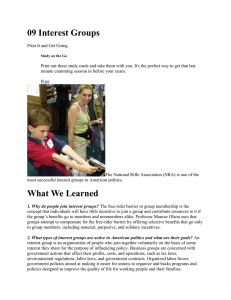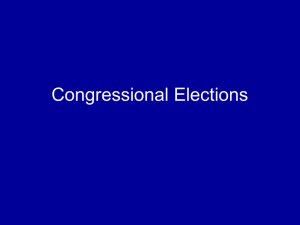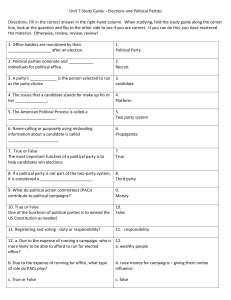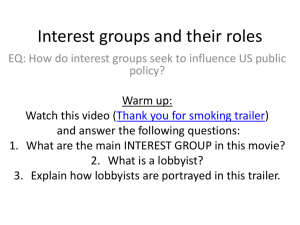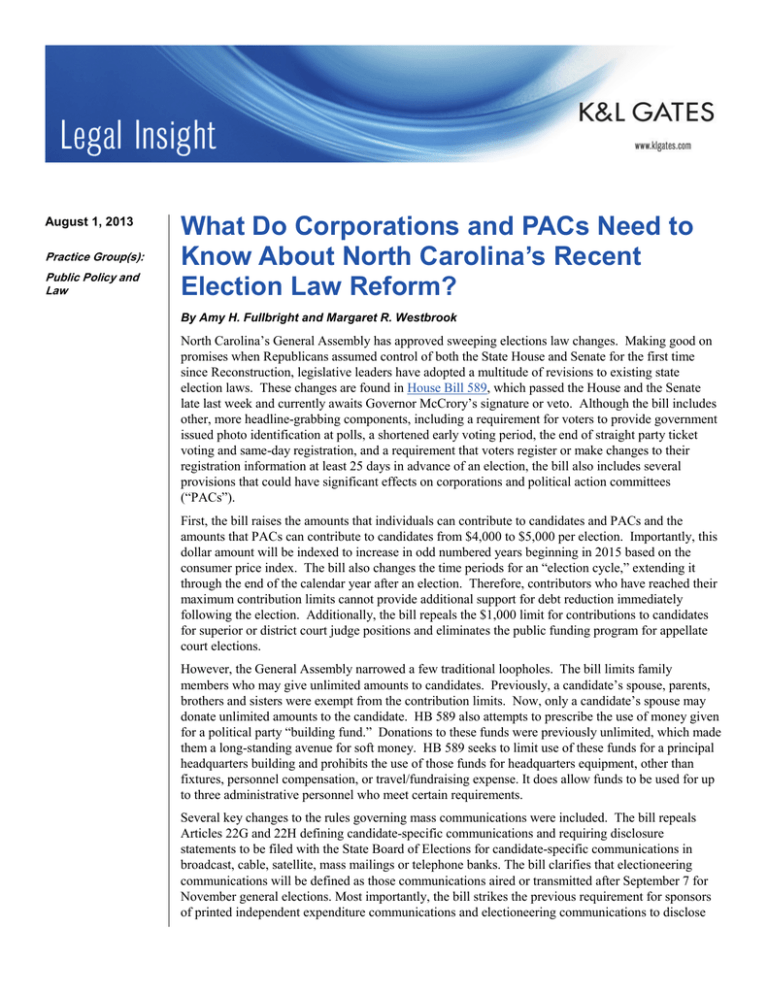
August 1, 2013
Practice Group(s):
Public Policy and
Law
What Do Corporations and PACs Need to
Know About North Carolina’s Recent
Election Law Reform?
By Amy H. Fullbright and Margaret R. Westbrook
North Carolina’s General Assembly has approved sweeping elections law changes. Making good on
promises when Republicans assumed control of both the State House and Senate for the first time
since Reconstruction, legislative leaders have adopted a multitude of revisions to existing state
election laws. These changes are found in House Bill 589, which passed the House and the Senate
late last week and currently awaits Governor McCrory’s signature or veto. Although the bill includes
other, more headline-grabbing components, including a requirement for voters to provide government
issued photo identification at polls, a shortened early voting period, the end of straight party ticket
voting and same-day registration, and a requirement that voters register or make changes to their
registration information at least 25 days in advance of an election, the bill also includes several
provisions that could have significant effects on corporations and political action committees
(“PACs”).
First, the bill raises the amounts that individuals can contribute to candidates and PACs and the
amounts that PACs can contribute to candidates from $4,000 to $5,000 per election. Importantly, this
dollar amount will be indexed to increase in odd numbered years beginning in 2015 based on the
consumer price index. The bill also changes the time periods for an “election cycle,” extending it
through the end of the calendar year after an election. Therefore, contributors who have reached their
maximum contribution limits cannot provide additional support for debt reduction immediately
following the election. Additionally, the bill repeals the $1,000 limit for contributions to candidates
for superior or district court judge positions and eliminates the public funding program for appellate
court elections.
However, the General Assembly narrowed a few traditional loopholes. The bill limits family
members who may give unlimited amounts to candidates. Previously, a candidate’s spouse, parents,
brothers and sisters were exempt from the contribution limits. Now, only a candidate’s spouse may
donate unlimited amounts to the candidate. HB 589 also attempts to prescribe the use of money given
for a political party “building fund.” Donations to these funds were previously unlimited, which made
them a long-standing avenue for soft money. HB 589 seeks to limit use of these funds for a principal
headquarters building and prohibits the use of those funds for headquarters equipment, other than
fixtures, personnel compensation, or travel/fundraising expense. It does allow funds to be used for up
to three administrative personnel who meet certain requirements.
Several key changes to the rules governing mass communications were included. The bill repeals
Articles 22G and 22H defining candidate-specific communications and requiring disclosure
statements to be filed with the State Board of Elections for candidate-specific communications in
broadcast, cable, satellite, mass mailings or telephone banks. The bill clarifies that electioneering
communications will be defined as those communications aired or transmitted after September 7 for
November general elections. Most importantly, the bill strikes the previous requirement for sponsors
of printed independent expenditure communications and electioneering communications to disclose
What Do Corporations and PACs Need to Know About
North Carolina’s Recent Election Law Reform?
the names of the five largest donors within the prior 6-month period, providing additional cover to
those who donate to independent expenditures and electioneering communications.
The legislation clarifies that lobbyists cannot collect from one or multiple contributors whereas the
previous law strictly referred to bundling from multiple contributors. This section also strengthens the
term “recipient” to include both a candidate and candidate campaign committee. This particular
portion of the bill becomes effective October 1, 2013.
Finally, the legislation clarifies that raffles may be administered by candidates and political
committees. Receipts and expenditures from raffles will be reported on campaign finance reports, and
ticket purchases will be considered contributions for reporting purposes.
Additional changes may be on the way in either a special session or the 2014 short session. During
the interim, the legislation directs the Joint Legislative Election Oversight Committee to study a
number of other changes, including the thresholds for the creation of political committees,
standardizing the reporting schedules for political committees, electioneering communications, and
independent expenditures, and eliminating the 48-hour campaign finance reporting obligations in
periods leading up to the elections.
Unless otherwise noted, the above provisions of the bill become effective January 1, 2014, except for
the voter identification requirement, which becomes effective on January 1, 2016. The bill has been
sent to the Governor and awaits his action.
James L. Joyce and Marissa C. Farrell contributed to this article. K&L Gates Government Relations
professionals will continue to monitor this legislation as it moves toward final enactment.
Authors:
Amy H. Fullbright
amy.fullbright@klgates.com
+1.919.743.7352
Margaret R. Westbrook
margaret.westbrook@klgates.com
+1.919.743.7311
Anchorage Austin Beijing Berlin Boston Brisbane Brussels Charleston Charlotte Chicago Dallas Doha Dubai Fort Worth Frankfurt
Harrisburg Hong Kong Houston London Los Angeles Melbourne Miami Milan Moscow Newark New York Orange County Palo Alto Paris
Perth Pittsburgh Portland Raleigh Research Triangle Park San Diego San Francisco São Paulo Seattle Seoul Shanghai Singapore Spokane
Sydney Taipei Tokyo Warsaw Washington, D.C. Wilmington
K&L Gates practices out of 48 fully integrated offices located in the United States, Asia, Australia, Europe, the Middle East and South
America and represents leading global corporations, growth and middle-market companies, capital markets participants and
entrepreneurs in every major industry group as well as public sector entities, educational institutions, philanthropic organizations and
individuals. For more information about K&L Gates or its locations, practices and registrations, visit www.klgates.com.
This publication is for informational purposes and does not contain or convey legal advice. The information herein should not be used or relied upon in
regard to any particular facts or circumstances without first consulting a lawyer.
©2013 K&L Gates LLP. All Rights Reserved.
2


